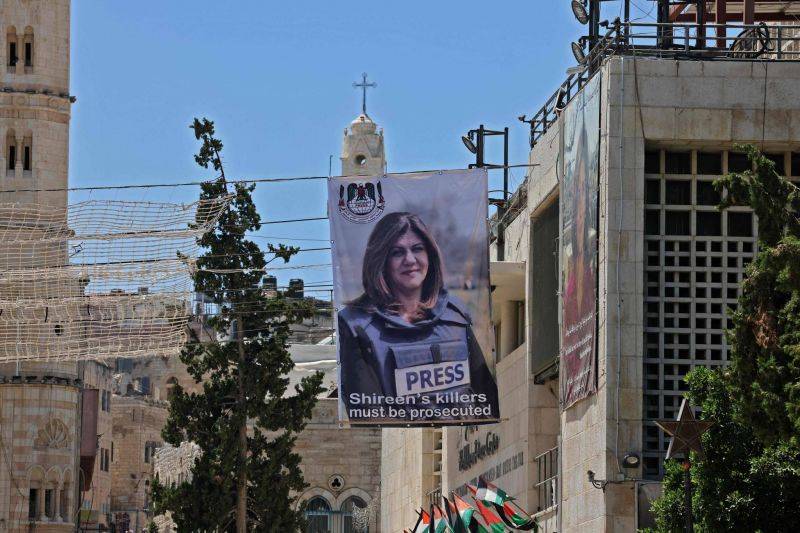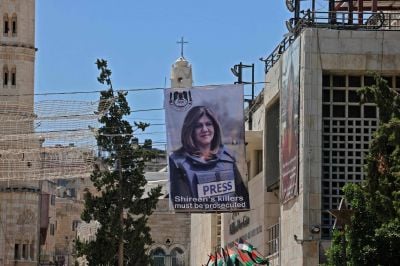
In the hometown of Shirine Abu Akleh, days before the US president's visit to the West Bank, posters call for justice in the assassination of the former al-Jazeera star journalist. Bethlehem, July 14, 2022. (Credit: Ahmad Gharabli/AFP)
“Of course I still believe in it,” Antoun Abu Akleh, Shireen Abu Akleh’s brother told L’Orient-Le Jour over the phone as he was getting ready to catch a flight to Washington.
He went on to reiterate that he would do everything in his power to obtain justice for the murder of his sister.
On Wednesday, he received a call from the American Secretary of State Antony Blinken, which he described as “good news.” Evidently, his three-page letter, written on the behalf of the whole family and addressed to the US president on July 8, did not get shoved in a drawer and forgotten. His voice was heard.
On the first day of US President Joe Biden’s trip to Israel, he received an invitation over the phone to fly to Washington. This could be his golden opportunity to have a face to face conversation with the American administration and insist on his family’s demands.
“It is the least we can do for Shireen,”Antoun Abu Akleh said.
A little over two months ago, the death of his younger sister sparked worldwide outrage.
In the region, the senior Al-Jazeera reporter was an icon.
After joining the news channel in 1997, she made a name for herself during the second Palestinian intifada (2000-2005), becoming over the years a symbol of perseverance.
Shireen Abu Akleh was a pillar of the Arab media landscape and a model of commitment for many young aspirants to the profession.
The images of her death near the Jenin refugee camp on May 11 at the age of 51 placed her even higher on an untouchable pedestal in the eyes of Palestinians and in the Arab street more generally, while international public opinion was swayed by her death.
As a woman, a Christian, a journalist and a US citizen, Shireen Abu Akleh had everything that could rouse Western sympathy.
Two months later, however, the unanimous indignation that her murder had provoked has subsided.
The media, international organizations, Palestinian and American authorites have all made public the results of their investigations.
Foreign embassies have denounced the crime. Blinken voiced public concern about the case. Even the UN Security Council spoke out, “strongly condemning” the assassination on May 13.
But nothing was done to hold the culprits accountable. On the ground, no measures were taken. No penalties were imposed.
Apart from the preliminary investigation carried out by the military justice authorities, Israel still refuses to investigate the case internally.
In the West Bank, daily life has resumed its normal course, punctuated by expulsions, military raids and arrests.
In this context, the US Secretary of State’s invitation feels like a consolation prize.
“When there's a murder, you don’t invite the family to sit and talk, you start legal proceedings,” said Mariam Barghouti, a Palestinian researcher based in Ramallah.
During President Biden’s Middle East tour, he did not meet with the family of the deceased, despite their request.
The case of Shireen Abu Akleh seems to have been relegated to the background.
“The initial outrage was genuine, but as time went on, and as it became clear that the issue was not really going to go away, there was a desire by the US administration to lay the issue to rest, especially with the president’s visit coming up,” Khaled Elgindy, a research associate at the Middle East Institute, told L’Orient-Le Jour.
Inflammatory context
It all began on May 11. The Bethlehem-born reporter was covering an Israeli army operation in Jenin, a town in northern West Bank considered one of the Palestinian resistance’s strongholds.
Abu Akleh was accompanied by four colleagues from Al-Jazeera and two independent journalists.
One of them was Ali Samoudi, who had woken her up at dawn in her hotel in Jenin’s suburbs so she could join him on the ground.
He would film almost the entire scene: Shortly after their arrival, in the early morning, the group was hit by several shots.
Several people were injured. For the star journalist, the bullet would be fatal. She died shortly after being shot in the face.
Beyond these few undeniable facts, little is known. What is for certain, however, is that all the members of the team were wearing “Press” security vests, which made them identifiable as media.
The incident, exacerbated by the images of police violence that took place during the funeral on May 13, immediately gained momentum.
Beyond the journalist’s international fame and role, the local context was extremely sensitive.
A wave of attacks unseen since the 2000s shook several Israeli localities, carried out by Palestinians, of whom two were from Jenin.
The government of Prime Minister Naftali Bennett, in a fragile situation since his election in June 2021 as a result of a very slim majority, had to respond firmly in order to prove his credentials.
Former Prime Minister Benjamin Netanyahu, overthrown by the ruling coalition after 12 years of uninterrupted rule, was waiting in the wings: the slightest misstep would be used to regain control of the political terrain.
The fresh memory of the Palestinian uprising in May 2021, which raised fears of a new wave of unrest, pushed the authorities to strike hard.
Across the West Bank, the army was being redeployed, arrests were increasing and travel was being restricted.
In this combustible environment, where 21 Palestinians were killed between March and April, things could easily go wrong, especially given Israel’s history of violence.
Israel, which has occupied the West Bank militarily since its victory in June 1967, has made a habit of storming Palestinian areas over the past two decades, despite the ban laid down in the Oslo II agreement of 1995.
For Israeli soldiers, firing live ammunition is no longer exceptional, even when unarmed civilians are involved.
Reporters Without Borders estimates that 35 journalists have been killed while doing their jobs in Israel and the occupied territories since 2000.
A new threshold of hostility towards the media was crossed on May 15, 2021, when the Israeli air force bombed the building housing the offices of Al-Jazeera and the Associated Press in Gaza.
It was in the same context that the events took place on the day of May 11 in Jenin, but the precise sequence of events was not immediately clear. However, investigations published by international media quickly corroborated the general picture conveyed by witnesses and supported the theory of an intentional murder.
On May 14, the investigative website Bellingcat published its first detailed report based on the decoding of videos and audio recordings, the cross-checking of testimonies and geolocation tools in order to reconstruct the scenario.
All the elements concurred to validate the thesis put forward by the witnesses, according to which Abou Akleh was targeted by Israeli fire.
The review of the data also contradicted the Israeli argument that armed Palestinian militants in the area were responsible for the shooting.
Other investigations, independent of each other, pointed in the same direction.
The Associated Press, CNN, the Washington Post and the New York Times all asserted that the journalist died under fire from the Israeli army.
The analysis of the bullets’ impact found on a tree also indicates that the shots were deliberate and targeted, ruling out the possibility of a random indiscriminate shooting.
Israel let off the hook
Despite all the evidence, doubt persists in the minds of some.
On June 8, Blinken stated at an academic conference at the ASU California Center that the facts have not yet been established.
The ambiguity is, in fact, deliberately maintained by certain stakeholders. The Israeli army, relying on the Palestinian Authority’s refusal to provide the projectile that killed Abu Akleh, maintains that “the inability to inspect the bullet (...) continues to cast doubt on the circumstances” of the incident.
This polarization of discourse, which has resulted in two opposing versions of the story, one Israeli and the other Palestinian, has led some to question credibility of the media, which they accuse of bias.
“We have done our part of the work, with as much rigor as possible, but we will never be able to convince the skeptics who simply don’t want the facts,” said Hiba Yazbeck, a Palestinian journalist who participated in the New York Times field investigation.
Despite Israeli reluctance, the general mood was leaning toward what appeared to be the only solution: an independent and international investigation.
This was carried out on June 24, with the publication of the report of the Office of the United Nations High Commissioner for Human Rights which endorsed the conclusions of the journalists while invalidating the Israeli thesis.
“All information we have gathered – including official information from the Israeli military and the Palestinian Attorney-General – is consistent with the finding that the shots that killed Abu Akleh and injured her colleague Ali Samoudi came from Israeli security forces and not from indiscriminate firing by armed Palestinians, as initially claimed by Israeli authorities. We have found no information suggesting that there was activity by armed Palestinians in the immediate vicinity of the journalists,” said Ravina Shamdasani, spokesperson for the organization.
The Israeli defense was shaken. But here again, the report had only a limited impact, all the more limited since the American official line did not take into account the UN conclusions.
On July 4, State Department spokesman Ned Price distanced himself from the discourse against Israel by stating that the army was “probably responsible for” the death of Shireen Abu Akleh, but that there was "no reason to believe that this was intentional.”
For the journalist’s family and many Palestinians, this decision to paint the assassination as an incident resulting from “tragic circumstances” is a stab in the back.
“It looked like just an attempt to whitewash the issue, absolving Israel of responsibility,” Elgindy said.
“There is a chronic unwillingness to hold Israel accountable, and that’s true not only of the US, but also of Europe. When it comes to action, there is reluctance in Europe just as there is in the US to oppose any real consequences on Israel — there just isn’t any political will,” he added.
While Antoun Abu Akleh and his family have not yet accepted Biden’s offer, the meeting in Washington suggested by the US administration looks like their last chance to keep the case from being completely buried.
The “affront and sense of betrayal” denounced by the Abu Akleh family in the July 8 letter to Biden is all the more clear given that Washington is not always so soft-spoken about the killing of its citizens.
“A number of US citizens were killed by Palestinian groups where we’ve seen much stronger condemnation and action by US officials. … Usually Congress will seize on those events to impose sanctions on the Palestinians,” Elgindy explained.
In March 2018, the Taylor Force Act, named after the American veteran, stabbed by a Palestinian in 2016, placed conditions on US aid to the Palestinian Authority. In order to receive funding, the PA must stop payments to the families of prisoners, among other things.
This article was originally published in French in L'Orient-Le Jour. Translation by Sahar Ghoussoub.
